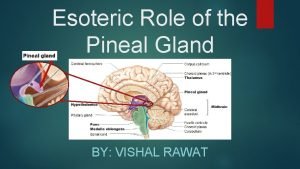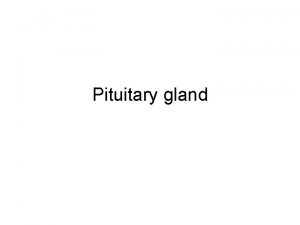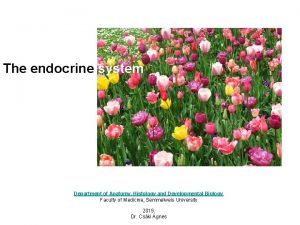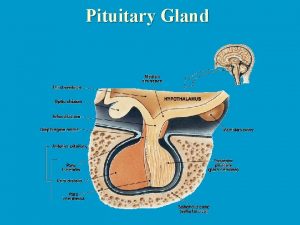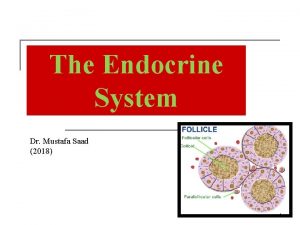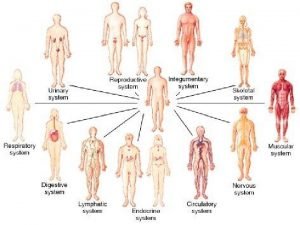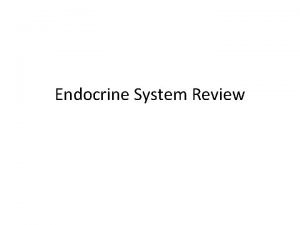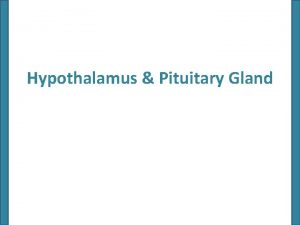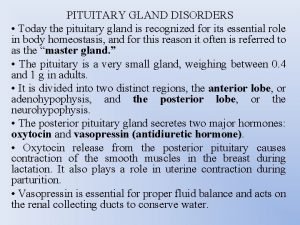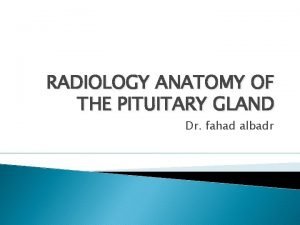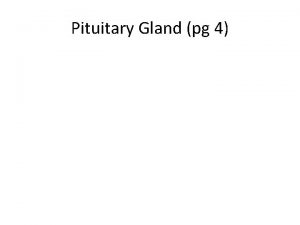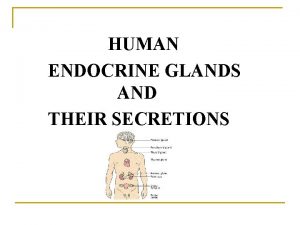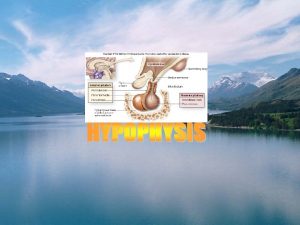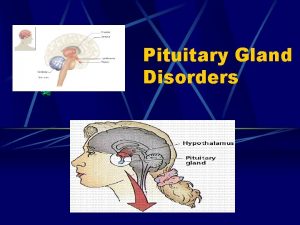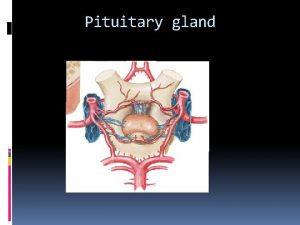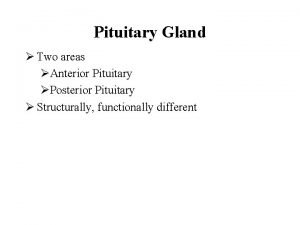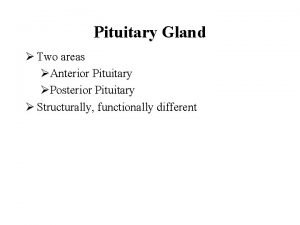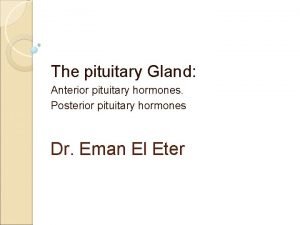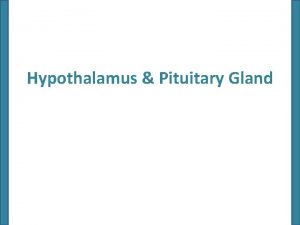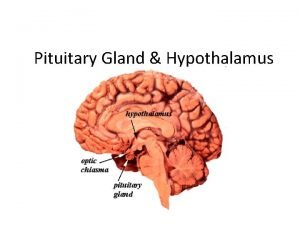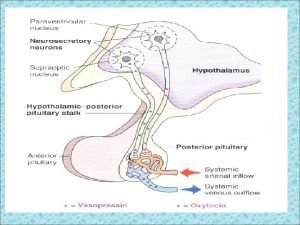ANATOMY OF THE PITUITARY GLAND Who suffer s

















- Slides: 17

ANATOMY OF THE PITUITARY GLAND Who suffer (s) from pituitary disturbances? 1) Soldier # 1 2) Soldier # 2 3) Soldier # 3 4) Soldiers # 1 & 3 1 2 3 Prof. Ahmed Fathalla

OBJECTIVES q q At the end of the lecture, students should be able to: Describe the position of the pituitary gland. List the structures related to the pituitary gland. Differentiate between the lobes of the gland Describe the blood supply of pituitary gland & the hypophyseal portal system.

PITUITARY GLAND (HYPOPHYSIS CEREBRI) q It is referred to as the master of endocrine gland q It is a small oval structure of 1 cm in diameter. q It doubles its size during pregnancy.

PITUITARY GLAND (POSITION) Optic chiasma Mammillary bod Body of sphenoid It lies in the hypophyseal fossa of the body of sphenoid bone, between optic chiasma (anteriorly) & mamillary bodies (posteriorly). q

PITUITARY GLAND (POSITION) It lies in the middle cranial fossa It is well protected in sella turcica of body of sphenoid Sella turcica

PITUITARY GLAND (POSITION) Infundibulum A fold of dura mater (Diaphragma sellae) covers the pituitary gland & has an opening for passage of infundibulum (pituitary stalk) connecting the gland to hypothalamus.

PITUITARY GLAND X-RAY SKULL: LATERAL VIEW SAGITTAL SECTION OF HEAD & NECK Pituitary gland Hypophyseal fossa Sphenoidal air sinus

IMPORTANT RELATIONS SUPERIOR: Diaphragma sellae q INFERIOR: Sphenoidal air sinuses q LATERAL: Cavernous sinuses q

SUBDIVISIONS OF PITUITARY GLAND Hypothalamo-hypophyseal tract The gland is subdivided into: 1) Anterior lobe (adenohypophysis): true gland, secretes hormones 2) Posterior lobe (neurohypophysis): connected to hypothalamus through hypothalamo-hypophyseal tract, tract stores hormones secreted by hypothalamic nuclei

BLOOD SUPPLY OF PITUITARY GLAND Cavernous sinuses ARTERIES: Superior & inferior hypophyseal arteries (branches of internal carotid artery) VEINS: hypophyseal veins drain into cavernous sinuses.

ARTERIES OF PITUITARY GLAND Infundibulum a hypothalamohypophseal portal vessel §The inferior hypophyseal: supplies posterior lobe of pituitary gland. §The superior hypophyseal: supplies infundibulum & forms a capillary network from which vessels pass downward & form sinusoids into the anterior lobe of pituitary gland (hypophyseal portal system).

ANTERIOR LOBE OF PITUITARY Hormone-releasing & inhibiting factors produced by hypothalamus use hypophyseal portal system of vessels to reach the anterior lobe of pituitary gland § Hypophyseal portal system

POSTERIOR LOBE OF PITUITARY Axons of supraoptic & paraventricular cells of hypothalamus send their secretion (neurosecretion) to posterior lobe of pituitary gland through hypothalamohypophyseal tract § Hypothalamohypophyseal tract

QUESTIONS

QUESTION 1 1) 2) 3) 4) Which one of the following structures is superior to the pituitary gland? Optic chiasma Diaphragma sellae Mammillary bodies Sphenoidal air sinuses

QUESTION 2 1) 2) 3) 4) Which one of the following venous sinuses drains hypophyseal veins? Superior sagittal Cavernous Transverse Sigmoid

THANK YOU & BEST WISHES
 Pituitary gland and pineal gland spiritual
Pituitary gland and pineal gland spiritual Thyoid gland
Thyoid gland Origin of posterior pituitary gland
Origin of posterior pituitary gland Endocrine organ
Endocrine organ Hormones secreted by adenohypophysis
Hormones secreted by adenohypophysis Hypophyseal fossa and pituitary gland
Hypophyseal fossa and pituitary gland Adrenal glands in body
Adrenal glands in body Gland
Gland What is the name
What is the name Hypersecretion of prolactin
Hypersecretion of prolactin Pituitary gland disorders
Pituitary gland disorders Nerve supply of pituitary gland
Nerve supply of pituitary gland Pituitary gland
Pituitary gland Pituitary gland hormones
Pituitary gland hormones Function of pituitary gland in points
Function of pituitary gland in points Diaphragm sella
Diaphragm sella Hashitoxicosis
Hashitoxicosis Health concerns
Health concerns
